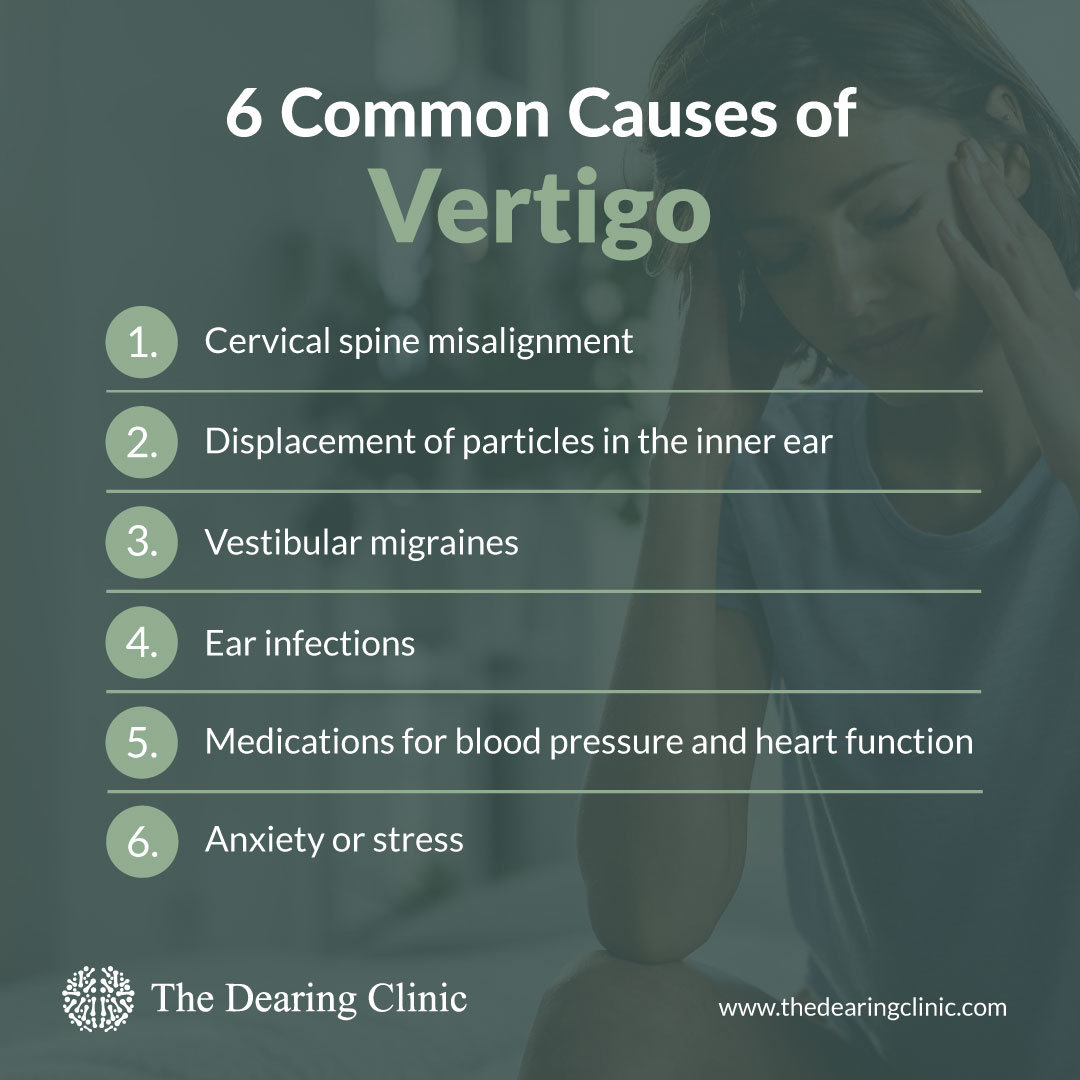Why Do I Feel Dizzy? Vertigo Causes, Treatments, FAQs
While it’s often triggered by sudden movement of your head, vertigo causes include tight head and neck muscles and issues with your cervical spine and/or inner ear. Effective vertigo treatment options include chiropractic adjustments, dietary changes, certain therapeutic techniques you can do at home, and more.


While it’s often triggered by sudden movement of your head, vertigo causes include tight head and neck muscles and issues with your cervical spine and/or inner ear. Effective vertigo treatment options include chiropractic adjustments, dietary changes, certain therapeutic techniques you can do at home, and more.
Feeling dizzy can be a disorienting, troubling, and overall unsettling experience. Whether it’s sudden slight lightheadedness or a spinning sensation that makes walking or even standing difficult, dizziness can impact your daily life in a major way.
So, if you’ve ever wondered why you feel dizzy, there’s a very likely cause. In many cases, a condition known as vertigo causes this dizziness. That’s why understanding what vertigo is (and isn’t!) and knowing all about its various types, common causes, and available vertigo treatment options can help you navigate this challenging sensation with confidence and (even more importantly) ease of mind.
In this article, we will explore the world of vertigo and answer frequently asked questions about this condition.
What Is Vertigo?
If vertigo causes the symptoms that are keeping you from enjoying your life and maybe even keeping you up at night with worry, let’s begin by answering one very important question: What is vertigo?
Vertigo is a specific type of dizziness characterized by a spinning or whirling sensation. Despite popular belief, it’s not simply feeling lightheaded. That means if what you’re feeling is best described as feeling like you’re “on a rocking boat,” the odds are pretty great that you’re not experiencing vertigo.
So, what causes vertigo? It’s often triggered by changes in your head position or simply moving your head, and it can last anywhere from a few seconds to several minutes. Unlike general dizziness or lightheadedness, which may have various different causes, including low blood pressure or medication side effects, vertigo is primarily caused by issues with your cervical spine and/or in your inner ear. In fact, vertigo often goes hand-in-hand with tinnitus (ear ringing) due to distortion of the nerves running from the ear into the brainstem, which results in nerve inflammation.
Interestingly, dizziness in general is often linked to tight head and neck muscles. But with vertigo, there’s a little more at play. Within the inner ear, there are structures responsible for detecting and maintaining balance, including the vestibular system, which consists of two types of organs.
The first organ is the vestibular canal system. It measures the speed of your head movement using canals that are prone to developing crystal-like substances that break into the canals and cause sustained sensations of spinning or flipping.
The second organ is known as the otolithic organ. It matches with the cervical spine and the canals and is made of tiny hair-like cells that measure translation, meaning they measure the speed of forward, backward, and sideways motion that doesn’t involve spinning or rotating. Combined with the neck, these three systems (the neck, otolithic organ, and the vestibular canal system) all need to match up in the central calculator, otherwise you may feel off, unbalanced, and even dizzy.
When any of these systems become damaged or disrupted, it can send incorrect signals to the brain, resulting in the sensation of vertigo (yet another reminder of why maintaining proper synchronization between your brain and body is so important!).
Vertigo causes debilitating issues, affecting your ability to perform daily activities. In severe cases, it’s even been known to cause nausea and vomiting. That’s why it’s important for those experiencing recurrent vertigo to seek medical attention and truly understand the underlying cause so they can explore effective vertigo treatment options.
Vertigo vs. Dizziness: What’s the Difference?
While dizziness and vertigo may seem similar, they are distinct sensations with different underlying causes. Dizziness is a general term that refers to feeling lightheaded, faint, unsteady, or weak. It can result from various factors, including low blood pressure, dehydration, medication side effects, or even certain medical conditions such as anemia.
As mentioned earlier, vertigo causes the illusion of movement or spinning, and it’s often triggered by changes in your head position or sudden head movement. It’s associated with issues in the inner ear or central nervous system, while dizziness feels more like “rocking on a boat” or the ground moving beneath your feet and occurs due to the central calculator issue in the brainstem that has a poor calculation or calibration. This is known as “cervicogenic dizziness,” a quite common condition that many people experience and often confuse with vertigo.
Types of Vertigo
Vertigo can be classified into two main types: peripheral vertigo and central vertigo. Let’s take a deeper look at the complexities of peripheral and central vertigo to better understand how they differ.
Peripheral Vertigo
Peripheral vertigo is the most common type of vertigo, and it’s often caused by issues within your inner ear. Conditions such as benign paroxysmal positional vertigo (BPPV), Meniere’s disease, and vestibular neuritis can all lead to peripheral vertigo.
Specifically, BPPV occurs when tiny calcium crystals known as otoliths become dislodged and float into the sensitive inner ear canals, which is known to cause a sensation of spinning or flipping. Meniere’s disease is caused by an excessive build-up of fluid in the inner ear and leads to severe vertigo episodes, hearing loss, and tinnitus. Finally, vestibular neuritis occurs when the vestibular nerve becomes inflamed, often due to a viral infection.
Additionally, there is a common origin that starts out as vertigo or dizziness in general and spreads into feeling one or all of the other symptoms of inner ear problems. Cervicogenic dizziness is very common and tends to become aggravated during certain times, such as when seasonal allergies are at a high, as the sinus congestion plays a role in the inner ear sensation of where you are in space as well.
Peripheral vertigo causes a sudden onset of dizziness and imbalance. As a result, it can be debilitating and have a significant impact on your daily life. Peripheral vertigo treatment options may include vestibular rehabilitation exercises (also known as vertigo exercises) and dietary changes to not only reduce fluid retention in the inner ear but also prioritize gut health. In fact, specific supplementation and dietary protocols may be necessary to fully recover. Given that this is a neurological system issue, having a healthy gut-brain axis is critical for full recovery. The inner ear fluid imbalance actually can be caused due to many problems related to gut, diet, and nutrients in general.
Central Vertigo
Another type of vertigo is known as central vertigo, which is caused by issues within the central nervous system. These issues can arise from a variety of triggers, including trauma, migraines, or certain disorders such as multiple sclerosis or a stroke. Unlike peripheral vertigo, central vertigo typically isn’t as easily treatable and may require more extensive medical intervention.
Additionally, it’s worth noting that the majority of chronic vertigo is chronically progressive cervical spine-generated cervicogenic vertigo. Those with a history of mild traumatic brain injury (mTBI), whiplash, viral illness, and visual weakness tend to develop these scenarios. They will occur in groups or progressions that develop into visual vertigo and other forms of central vertigo.
Central vertigo causes unique challenges throughout the diagnostic process and during management due to its underlying causes within the brain and spinal cord. As a result, those experiencing central vertigo may require a multidisciplinary approach to address the complex nature of their condition.
Additionally, those with central vertigo must be specifically evaluated for functional deficits. First, measuring vestibulo-ocular function with traditional audiology equipment (VNG-vestibulonystamography) will evaluate eye movement quality, accuracy, and speed to determine exactly where the source of the problem lies in the motor coordination system of the brainstem. We compare that to balance using dynamic posturography measurements to determine how the balance is organized or coordinated. Matching these tests and others to your condition will inform exactly what to treat and how to best treat it.
Central vertigo treatment strategies include rehabilitation to improve balance and coordination and ongoing monitoring to prevent potential complications. Using functional neurological exercises at home, in-office rehabilitation strategies, and manual therapies for the cervical spine often reveal improvements when you strengthen the weaknesses within your reflexive system.
6 Common Vertigo Causes
Some of the most common vertigo causes include BPPV, Meniere’s disease, vestibular neuritis, and labyrinthitis. While vertigo itself is symptomatic of an underlying issue with the inner ear or central nervous system, there are several common causes that can trigger vertigo. These common vertigo causes include:
1. Cervical spine misalignment. When your cervical spine is out of alignment, your body becomes tight and stressed, pulling vertebrae further from ideal alignment. This increases the stress on your nerves and confuses the nerve signals coming into your brain about where you are in your space, which results in episodes of vertigo.
2. BPPV. As mentioned earlier, this is the displacement of otoliths in the inner ear.
3. Migraines. Certain types of migraines, known as vestibular migraines, can cause severe vertigo episodes.
4. Ear infections. Infections of the inner or middle ear can disrupt the normal functioning of the vestibular system.
5. Medications. Some medications, particularly those known to impact blood pressure and heart function, can cause vertigo.
6. Anxiety and/or stress. Emotional factors can trigger or exacerbate vertigo symptoms in some people.
In addition to the above-mentioned causes, one of the most common causes of vertigo is head injuries. Experiencing any trauma to the head, such as a concussion, can damage your vestibular system, causing symptoms of dizziness and imbalance. Remember that it’s critical to seek medical attention after any head injury to assess any potential impact on your vestibular function and address vertigo symptoms immediately.

Common Vertigo Symptoms
Despite common belief, vertigo causes more than just dizziness. In fact, it often comes with a range of other symptoms that can vary in both intensity and duration. Some common symptoms of vertigo include:
- Spinning or whirling sensation
- Loss of balance and coordination
- Nausea and vomiting
- Sweating
- Visual disturbances
- Difficulty focusing or concentrating
- Anxiety or panic attacks
If you experience these symptoms, it’s critical to consult with a healthcare professional for an accurate diagnosis and appropriate vertigo treatment plan. Here’s why: In addition to the physical symptoms, vertigo can also have a significant impact on your mental health.
Understandably, the constant feeling of unsteadiness and the fear of sudden dizzy spells can trigger anxiety or panic attacks in many people. This psychological aspect of vertigo can further exacerbate your condition, creating a cycle of symptoms that affect both your body and mind.
Remember, you don’t have to live this way and targeting the root cause of your symptoms can provide the lasting relief you deserve.
5 Natural Vertigo Treatment Options
When it comes to treating vertigo, there are certain natural remedies and lifestyle habits known to help alleviate symptoms and improve your overall well-being. Here are some of the top natural vertigo treatment options worth exploring.
1. Chiropractic adjustments
Realigning your cervical spine can help to resync your brain and body and loosen the tight head and neck muscles connected with vertigo. Specifically, the Epley maneuver, which is a series of head movements performed to reposition the otoliths in the inner ear and alleviate symptoms of BPPV, may prove useful if BPPV is the root cause of your vertigo.
2. Vestibular rehabilitation therapy (VRT)
This type of therapy consists of exercises and therapeutic treatments designed to improve balance and reduce vertigo episodes. Here at The Dearing Clinic, our therapies go beyond traditional physical therapy and visual therapies to include vision, vestibular, and cervical spine therapies to provide a comprehensive treatment experience. This approach allows your brain to sync with your body more efficiently and in a deeper way to promote long-term stabilization.
In addition, we teach you therapeutic techniques to help you regain balance, strength, and even eye movement control. Contact us to learn more about whether or not VRT should be a part of your vertigo treatment plan.
3. Dietary changes
Following an anti-inflammatory diet can go a long way in resyncing your brain and body. Additionally, reducing your salt intake and avoiding alcohol and caffeine can help to manage fluid retention in your inner ear, which can exacerbate vertigo symptoms.
4. Stress management
Practicing relaxation techniques such as deep breathing, meditation, and yoga can help reduce stress levels and alleviate your vertigo triggers.
5. Herbal remedies
Finally, certain herbs, such as ginger and ginkgo biloba, have been traditionally used to relieve the dizziness that vertigo causes. You can even sip ginger tea as part of your stress management routine to get two benefits in one!
4 FAQs About Vertigo
Here are some frequently asked questions about vertigo causes, treatments, and more.
1. Is vertigo the same as motion sickness?
While they may share some similar symptoms, vertigo is not the same as motion sickness. Vertigo is a specific type of dizziness caused by issues with the inner ear or central nervous system, while motion sickness is typically triggered by conflicting motion signals received by the brain, such as when on a moving vehicle.
2. Can stress cause vertigo?
Stress and anxiety can indeed contribute to or trigger vertigo symptoms in some people. Research has shown that emotional factors can disrupt the balance-regulating mechanisms in the inner ear, leading to symptoms of vertigo.
3. Is vertigo treatable?
Yes, vertigo can be treated. Specific vertigo treatments depend on the underlying cause and may involve chiropractic care, physical therapy, lifestyle changes, natural remedies, or a combination of these options.
4. When should I see a doctor about my vertigo?
You should see a healthcare professional if you experience recurring or severe vertigo episodes, if your symptoms worsen or change suddenly, or if your dizziness is accompanied by other concerning symptoms.
Ready to feel like you again?
* Your next step toward feeling better starts today. At The Dearing Clinic we make it simple to get started with care that truly fits your life. Book your visit now and let’s design a plan that restores your energy, relieves your pain, and helps you enjoy more of what matters most.


